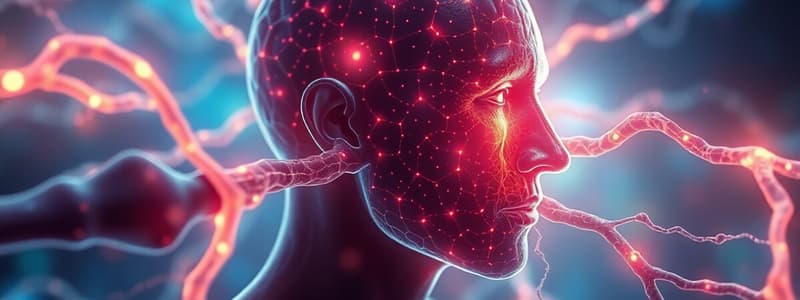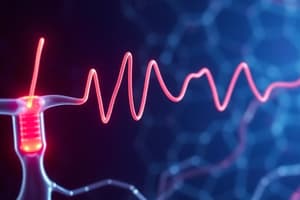Podcast
Questions and Answers
What unit is used to measure electrical potential?
What unit is used to measure electrical potential?
- Milliamperes
- Volts (correct)
- Watt-hours
- Coulombs
What is the role of a voltmeter in measuring electrical potential?
What is the role of a voltmeter in measuring electrical potential?
- It measures voltage across two points. (correct)
- It measures the resistance in a circuit.
- It converts AC current to DC current.
- It generates electrical power.
Why do many molecules in our body fluids have electrical charges?
Why do many molecules in our body fluids have electrical charges?
- Due to physical movement within the cells.
- Due to the presence of negative groups. (correct)
- Due to the presence of positive ions only.
- Due to high temperatures in the body.
What is an example of a charged substance found in body fluids?
What is an example of a charged substance found in body fluids?
What are millivolts a subunit of?
What are millivolts a subunit of?
What is the resting membrane potential primarily defined as?
What is the resting membrane potential primarily defined as?
Which factors contribute to the establishment of resting membrane potential?
Which factors contribute to the establishment of resting membrane potential?
How is the resting membrane potential typically measured?
How is the resting membrane potential typically measured?
What role do ion channels play in maintaining resting membrane potential?
What role do ion channels play in maintaining resting membrane potential?
What happens to the resting membrane potential during depolarization?
What happens to the resting membrane potential during depolarization?
What is the relationship between opposite charges in an electrical force?
What is the relationship between opposite charges in an electrical force?
What happens to same charges in terms of electrical force?
What happens to same charges in terms of electrical force?
Which statement best describes the force between two opposite charges?
Which statement best describes the force between two opposite charges?
Which statement is true regarding electrical force and charge types?
Which statement is true regarding electrical force and charge types?
In what way do opposite electrical charges affect each other?
In what way do opposite electrical charges affect each other?
What primarily causes the leakage of ions across the cell membrane?
What primarily causes the leakage of ions across the cell membrane?
Which factor contributes to the negative charge inside the cell?
Which factor contributes to the negative charge inside the cell?
How does the Na/K pump contribute to the resting membrane potential?
How does the Na/K pump contribute to the resting membrane potential?
What does the term 'resting membrane potential' refer to?
What does the term 'resting membrane potential' refer to?
What role do organic molecules play in resting membrane potential?
What role do organic molecules play in resting membrane potential?
What is the primary function of the pump described?
What is the primary function of the pump described?
How many Na+ ions are transported outside for every set of K+ ions moved inside?
How many Na+ ions are transported outside for every set of K+ ions moved inside?
What type of charge does the pump create inside the membrane?
What type of charge does the pump create inside the membrane?
What happens to the charges outside the membrane as a result of the pump's function?
What happens to the charges outside the membrane as a result of the pump's function?
Which of the following ions is moved into the cell by this pump?
Which of the following ions is moved into the cell by this pump?
Flashcards are hidden until you start studying
Study Notes
Membrane Potential
- The resting membrane potential is a difference in electrical charge across the cell membrane.
- This potential is measured in volts (millivolts), which indicate the electrical force across the membrane.
Genesis of Resting Membrane Potential
- The resting membrane potential is generated by three main factors:
- Ion Channels: Channels in the cell membrane allow for the leakage of ions across the membrane, contributing to the charge difference
- Na+/K+ Pump: The sodium-potassium pump actively transports sodium ions out of the cell and potassium ions into the cell, creating an electrochemical gradient. This pump moves three sodium ions out for every two potassium ions in, resulting in a net negative charge inside the cell.
- Charged Molecules: Proteins and other organic molecules inside the cell are negatively charged (anions) and cannot cross the cell membrane, contributing to the negative charge inside the cell.
Studying That Suits You
Use AI to generate personalized quizzes and flashcards to suit your learning preferences.




